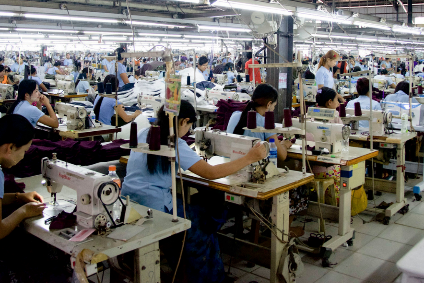
Non-Governmental Organisation the Fair Wear Foundation has outlined a number of steps businesses can take to help workers and suppliers following the military coup in Myanmar last month that has threatened to impact the country’s clothing industry.
The Southeast Asian country’s military seized power on 1 February, following weeks of worsening political tensions as a result of disputed elections in November 2020.
A state of emergency has now been imposed for up to one year, state counsellor Aung San Suu Kyi and president U Win Myint have been detained, and communications in much of the country have been cut off.
“2021 is deeply concerning. We urge the full and immediate restoration of democratic rights and institutions,” says the Fair Wear Foundation. “Many of our members do business in Myanmar and our hearts and prayers are with the Myanmar people for a swift, peaceful and democratic resolution to this crisis – one that does not take away the economic progress made by the hardworking people of Myanmar.”
The Foundation is asking its member brands sourcing from Myanmar to take steps to ensure worker safety, including protection of union members, and ensure full and on-time payment of workers.
“Please consult not only with your suppliers but also local and international civil society organisations when possible,” it adds. “The situation is quite fluid, and while some basic services like the internet, public transportation and banking seem to be working, it is not clear what the short and long-term impact of the military’s actions will be.”

US Tariffs are shifting - will you react or anticipate?
Don’t let policy changes catch you off guard. Stay proactive with real-time data and expert analysis.
By GlobalDataThe Foundation has outlined a number of steps brands can take in the immediate term:
- Communicate with all suppliers and seek to understand the status of production and the situation for workers:
- Is production still running?
- Will the factory pay workers on the upcoming payday?
- Are workers able to safely travel to the factory by regular transportation?
- Have delivery times for finished goods been impacted? What about the import of raw material/fabric?
- If needed, show leniency in terms of delivery dates, particularly if suppliers must scale back production due to worker absenteeism.
- Brands should honour all existing commitments made to factories.
- Factories should be encouraged to ensure on-time payment of the upcoming January salaries.
- Grievance mechanisms for workers should remain in place, both internal and external, and brands should follow up with their suppliers on worker grievances, as needed.
- And in-line with Fair Wear’s ‘Enhanced Monitoring Programme’ for Myanmar, the Foundation is urging brands and their suppliers in Myanmar to refrain from buying any goods and services from companies known to be linked to – or owned by – the military services of Myanmar.
More specifically:
- Member brands are to refrain from sourcing from factories in the three Special Economic Zones Dawei, Kyauk Phyu and Thilawa, as the legal framework is considered not to provide adequate protection of workers’ rights including proper access to grievance mechanisms. Furthermore, the development of the SEZ’s is often associated with land grabbing and forced evictions.
- In order not to provide (indirect) support to the military, member brands are required to refrain from sourcing from companies with known direct links to the military, including in particular with companies that fall under the economic conglomerates owned by the army, i.e. the Myanmar Economic Corporation (MEC) and the Union of Myanmar Economic Holdings (UMEH, also known as Myanmar Economic Holding Ltd. or MEHL). This includes factories that are operating from Ngwe Pinlae Industrial Zone and Pyinmabin Industrial Zone, which are owned by UMEH/MEHL.
Click on the following links for further analysis of the potential impact of the Myanmar coup on the country’s clothing industry:
Clothing sector likely major loser from Myanmar coup
Brands being urged to stick with Myanmar suppliers
Coup will prompt re-evaluation of Myanmar sourcing
Here’s why companies source apparel from Myanmar



